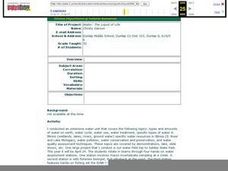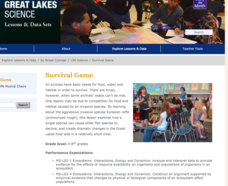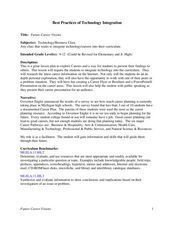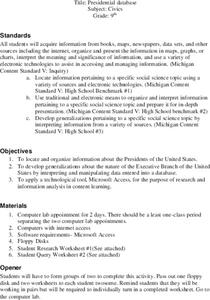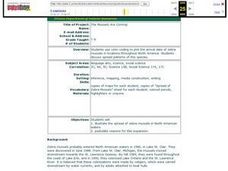Curated OER
Gainging Perspective
Seventh graders examine and evaluate different perspectives of human and wolf interactions. They develop a conclusion based on research through the use of electronic resources.
Curated OER
Crazy Hair
Students decorate small styrofoam cups with faces and plant grass seeds in the cups in this Science and Art lesson for the early-elementary classroom. Emphasis is placed upon the science of seed growth. The lesson includes resource links.
Scholastic
Perfect Postcards: Illinois
Connect the geography and history of Illinois using an art-centered lesson plan on the railroads. The railroad connected once-distant places, particularly in the Midwest. Using research, class members create postcards of fictional...
National Institute of Food and Agriculture
Water Pollution Demonstration
Water pollution is everywhere, and pollutants range from oil to fertilizers. Bring the concept to life by demonstrating the difficulties in getting particular pollutants out of water.
Curated OER
Why Should We Clean The Beach?
Students volunteer for the International Coastal Cleanup. They describe the purpose of the Lake Michigan Foundation and a history of the dunes. They reflect on their experiences with writing.
Curated OER
Water: The Liquid of Life
Sixth graders complete a lesson on the properties, types and amounts of water on Earth. In groups, they travel between stations to identify water resources in Illinois and pollution sources. They complete the lesson with a field trip...
Michigan Sea Grant
Survival Game
Musical chairs may be a classic game, but Ruffe Musical Chairs is a unique lesson on invasive species! Using the time-honored game, pupils role play the behaviors of the invasive fish called Eurasian ruffe. Learning about this aggressive...
Curated OER
Future Career Visions
Learners explore a variety of careers. They research careers they may be interested in pursuing. Students create a Career Flyer or Brochure and a PowerPoint presentation to present to the class.
Curated OER
Presidential Database
Ninth graders research the Presidents of the United States. They develop generalizations about the nature of the Executive Branch using the researched information. Students complete a Query worksheet about the Presidents.
Curated OER
Cultural Corner- "Mexico"
Students use print and electronic resources to gather information about Mexico. They present a mini-museum to share with students, parents, and other interested classes around the district. They present their information in a video...
Curated OER
Shark Attack
Young scholars study the white shark and the red triangle. In this critical thinking activity students assess the validity of facts about sharks and create a public service announcement either promoting shark or human protection.
Curated OER
The Mussels Are Coming
Students work together to identify and describe the various types of mussels. Using a color-coded system, they plot the arrival date of zebra mussels in North American waters. They discuss the increase in their population with the class.
Curated OER
Impervious Surfaces
High schoolers explore the concept of philanthropy. In this environmental stewardship lesson, students compose personal mission statements that express their personal beliefs about their responsibility to the environment.
Curated OER
Ecotourism in National Parks and Wilderness
Students develop a plan for ecotourism after researching a nearby national park or wild area.
Michigan Sea Grant
Wetlands
Wetlands may not sound particularly ornate, but they are as important as any habitat! With a hands-on activity, young scientists build a wetland model and observe its many functions in action. They discover the importance of wetlands to...
Michigan Sea Grant
Great Lakes, Great Careers
Pupils play a question-asking game to investigate careers relating to marine and aquatic science, then conduct research to further investigate the career of their choice—examples range from marine veterinarian to underwater...
Agriculture in the Classroom
Design 'Y'er Genes
How do changes in DNA affect an organism? Scholars explore chromosomes, genes, DNA, and mutations by modeling the DNA of a strawberry. They build a DNA model, then manipulate it to show how changing the genes transforms the strawberry...
Education World
Black History Month Rap
Young scholars write a rap or hip-hop lyric about the life of a famous Black American. They explore famous Black Americans in history and explore how the rap form compares to other forms of poetic expression.
Curated OER
To Market to Market
Fourth graders research a product and participate in an integrated simulation of a free market economy where students will create, buy and sell a good or service. In completing this activity, 4th graders understand the concepts and...
Curated OER
Non Native Species: English Ivy-Landscape Plant or Deadly Killer?
Young scholars examine an area overrun by English Ivy. They explore how invasive species affect an ecosystem. They also study about the lack of biodiversity and how to measure it out in the field.
Curated OER
Technology: Creating Introductions with Digital Cameras
Third graders discover how to use digital video cameras to record introductions of themselves for Powerpoint presentations. They decide what to say, which points to highlight, and how to interest viewers. Their Powerpoint presentations...
Curated OER
Gallery Walk
After reading Mowgli's Brothers, each third grader will choose an animal and write a poetry, in couplet form, for that animal. Then, they complete a black-line drawing of their animal. Consider having learners post both of their finished...
Curated OER
Landfills: A Solid Waste Management Plan
Students are able to list the types of household waste that they produce daily. They are able to describe some other types of waste that are produced by industry or agriculture to help maintain their lifestyles. Students are able to...
Curated OER
Mammals: Mammals and Their Ways
Students study the difference between innate and learned behaviors. They observe the adaptations and behaviors of mammals in this series of lessons.







